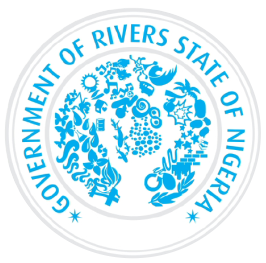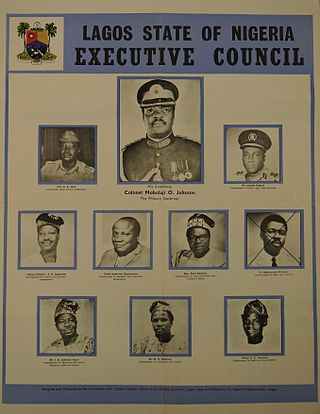Related Research Articles

Kebbi State is a state in northwestern Nigeria. Kebbi State is bordered east and north of Sokoto and Zamfara states, and to the south by Niger state while its western border forms part of the national borders with Benin Republic for 103 km and Niger for 207 km. Named for the city of Birnin Kebbi—the state's capital and largest city, Kebbi state was formed from Sokoto state on 27 August 1991. Of the 36 states of Nigeria, Kebbi is the tenth largest in area and 18th most populous, with an estimated population of about 4.4 million as of 2016. The state is known as land of equity.

The National Economic and Development Authority is an independent cabinet-level agency of the Philippine government responsible for economic development and planning. It is headed by the president of the Philippines as chairman of the NEDA board, with the Secretary of Socioeconomic Planning as vice-chairman. A number of Cabinet members, the Governor of the Bangko Sentral ng Pilipinas, the Chairperson of the Metropolitan Manila Development Authority, the Chief Minister of Bangsamoro, the Secretary of Information and Communications Technology, the Chairman of the Subic–Clark Area Development Corporation, and the National President of the Union of Local Authorities of the Philippines are members of the NEDA Board.
Mohammed Sani Sami was Governor of Bauchi State, Nigeria from January 1984 to August 1985 during the military regime of Major General Muhammadu Buhari.

The Government of Rivers State consists of elected representatives and appointed officials responsible for the government of Rivers State, Nigeria. Rivers State has a population of about 5 million people, and is one of the 36 states that make up the Federal Republic of Nigeria. The state government is composed of the executive, legislative, and judicial branches, whose powers are vested by the Constitution in the House of Assembly, the Governor and the High Court. The judiciary operates independently of the executive and the legislature. At the local level, elected officials are in charge of local government areas.

Abubakar Atiku Bagudu is a Nigerian politician who is the current Nigerian minister of budget and economic planning. He served as governor of Kebbi State from 2015 to 2023. He also served as the senator representing the Kebbi Central senatorial district from 2009 to 2015.
The Executive Council, also known as the Governor's Cabinet is the highest administrative decision-making authority in Rivers State. It is part of the executive branch which is the most influential branch of the state government. It comprises the governor, deputy governor, Secretary to the State Government, chief of staff, commissioners and special advisers. All of its members excluding the Deputy Governor are appointed by the Governor of Rivers State and confirmed by the House of the Assembly of the state.

The Lagos State Executive Council is the highest formal governmental body that plays important roles in the Government of Lagos State headed by the Governor of Lagos State. It consists of the Deputy Governor, Secretary to the State Government, Chief of Staff, Commissioners who preside over ministerial departments, and the Governor's special aides.
The Akwa Ibom State Executive Council is a governmental body that plays important roles in the Government of Akwa Ibom State headed by the Governor of Akwa Ibom State. It consists of the Deputy Governor, Secretary to the State Government,Chief of Staff to the Governor, Head of Civil Service, Deputy Chief of Staff, Commissioners who preside over ministerial departments, and the Governor's special aides.
The Kwara State Executive Council is the highest formal governmental body that plays important roles in the Government of Kwara State headed by the Governor of Kwara State. It consists of the Deputy Governor, Secretary to the State Government, Chief of Staff, Commissioners who preside over ministerial departments, and the Governor's special aides.
The Bayelsa State Executive Council is the highest governmental body that plays important roles in the Government of Bayelsa State headed by the Governor of Bayelsa State. It consists of the Deputy Governor, the Secretary to the State Government, Chief of Staff, Commissioners who preside over ministerial departments, and the Governor's special aides.
The Cross River State Executive Council is the highest governmental body that plays important roles in the Government of Cross River State, Nigeria, headed by the Governor of Cross River State. The Council consists of the Governor, Deputy Governor, Secretary to the State Government, and Commissioners who are Chief Executive Officers of Ministries in the State.
The Taraba State Executive Council is the highest formal governmental body that plays important roles in the Government of Taraba State headed by the Governor of Taraba State. It consists of the Deputy Governor, Secretary to the State Government, Chief of Staff, Commissioners who preside over ministerial departments, and the Governor's special aides.
The Jigawa State Executive Council is the highest formal governmental body that plays important roles in the Government of Jigawa State headed by the Governor of Jigawa State. It consists of the Deputy Governor, Secretary to the State Government, and Commissioners who preside over ministerial departments.
The 1999 Kebbi State gubernatorial election occurred on January 9, 1999. APP candidate Adamu Aliero won the election, defeating PDP candidate Mohammed Kaliel.
The 2007 Kebbi State gubernatorial election occurred on April 14, 2007. PDP candidate Usman Saidu Nasamu Dakingari won the election, defeating ANPP Farouk Bello Bunza and other 6 candidates.
The 2023 Kebbi State gubernatorial election was held on 18 March 2023, to elect the Governor of Kebbi State, concurrent with elections to the Kebbi State House of Assembly as well as twenty-seven other gubernatorial elections and elections to all other state houses of assembly. The election — which was postponed from its original 11 March date — was held three weeks after the presidential election and National Assembly elections. Incumbent APC Governor Abubakar Atiku Bagudu was term-limited and could not seek re-election to a third term. Nasir Idris, a teachers' union leader, held the office for the APC by a margin of 6% over the PDP nominee — former Army major general Aminu Bande.
Bala Ibn Na'allah is a Nigerian politician and senator. He is representing Kebbi South Senatorial seat in the Senate of Nigeria and was the Deputy Majority leader in the 8th Nigerian senate. On August 29, 2021, Na'allah's eldest son, Abdulkarim Bala Na'Allah was murdered by unknown assailants in his residence in Kaduna state. In 2023, Na'allah lost his reelection to the Senate as he was defeated by Garba Maidoki who polled 75,232 votes while Na'allah scored 70,785.
In the Federal Republic of Nigeria, state executive councils are the highest formal governmental body in state governments headed by governors.
The Ahmadu Bello University (ABU) is a public research university located in Zaria, Kaduna State, Nigeria. It was opened in 1962 as the University of Northern Nigeria. The university has four colleges, three schools, 18 faculties, 110 academic departments, 17 centres, and seven institutes with over 600 professors, about 3000 academic staff and over 7000 non-teaching staff. The university has over 400 postgraduate programmes reflecting its strife to become a postgraduate studies-centred university. The university operates from two campuses in the ancient cosmopolitan city of Zaria, the Samaru Campus where the Senate Building and most of the faculties are located and the Kongo Campus, hosting the faculties of Law and Administration. It has been adjudged to be the largest university in Sub-Saharan Africa, in terms of land occupied, owing to the numerous buildings it has.
References
- ↑ "Home | The Official Website of Kebbi State Government". kebbistate.gov.ng. Retrieved 2022-11-01.
- 1 2 "The Executive Council | The Official Website of Kebbi State Government". kebbistate.gov.ng. Retrieved 2022-11-01.
- 1 2 "The Deputy Governor | The Official Website of Kebbi State Government". kebbistate.gov.ng. Retrieved 2022-11-01.
- 1 2 "Secretary to the State Government | The Official Website of Kebbi State Government". kebbistate.gov.ng. Retrieved 2022-11-01.
- ↑ "The Executive Council - The Official Website of Kebbi State". Kebbistate.gov.ng. Retrieved 2 June 2018.
- ↑ "The Executive Governor - The Official Website of Kebbi State". Kebbistate.gov.ng. Retrieved 2 June 2018.[ permanent dead link ]